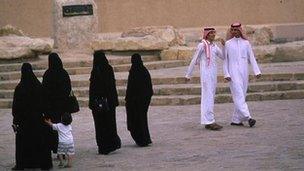Saudi Arabia religious police chief announces new curbs
- Published

The head of Saudi Arabia's notorious religious police has told the media he will curb his force's powers in a bid to clamp down on excesses.
Some functions, such as arrests and interrogations, will be handed over to other state bodies, Abdul Latif Abdul Aziz al-Sheikh told al-Hayat daily.
The force is supposed to police dress codes and religious observance.
But there has been growing anger among Saudis at examples of aggressive behaviour by the "mutawa".
In recent months, a mobile phone clip of a religious policeman ordering a young woman to leave a mall because of her make-up went viral.
Many Saudis also blamed the mutawa for causing a fatal car crash when they chased a man who had refused to turn his radio down.
Mr Sheikh was appointed in January amid growing public criticism of the mutawa - officially known as the Commission for the Promotion of Virtue and Prevention of Vice.
Their sanctioned duties include preventing women driving, enforcing modest dress codes, policing bans on public entertainment and making sure all businesses close for prayers five times a day.
Two weeks into the job, Mr Sheikh banned volunteers from serving in the force, and in April warned that those found to have harassed people would be punished.
He has publicly dressed down officers deemed to have applied themselves overzealously to their duties.
Now Mr Sheikh has announced a new raft of measures to curb their powers.
Arrests, interrogations, house raids and searches will now be carried out by other police or judicial bodies, he told al-Hayat.
Elsewhere he promised his officers would be forced to adhere to a new code of practice.
He said he would target the practice of preventing women unaccompanied by family from entering shopping centres.
But he still faces resistance from within his own organisation to any curb on its powers, says the BBC's Arab affairs analyst Sebastian Usher.
- Published14 July 2012
- Published13 January 2012
- Published18 May 2011
- Published13 May 2011
- Published29 August 2023